牛津译林版(2019)必修 第二册Unit 4 Exploring literature Grammar and usage课件(共22张PPT)
文档属性
| 名称 | 牛津译林版(2019)必修 第二册Unit 4 Exploring literature Grammar and usage课件(共22张PPT) | 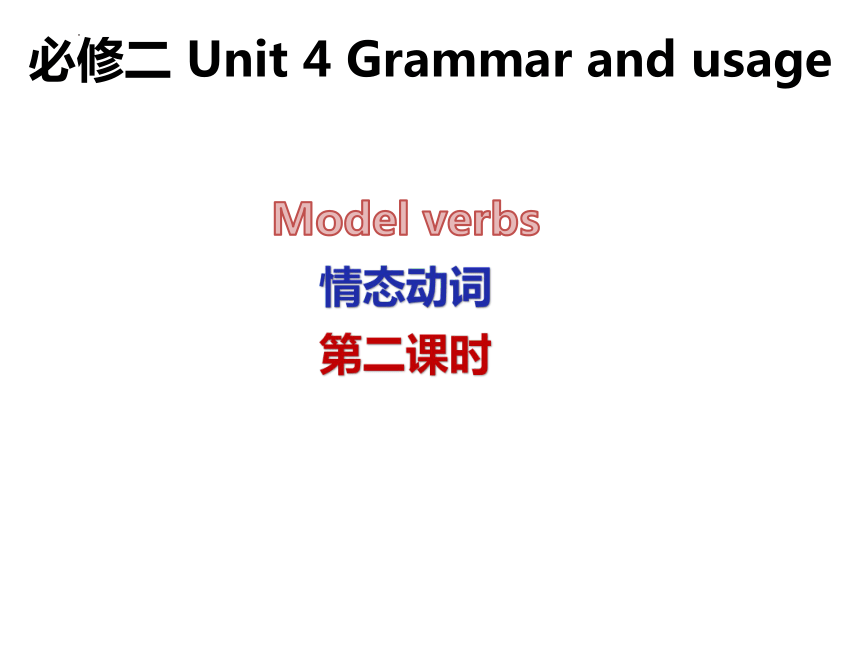 | |
| 格式 | pptx | ||
| 文件大小 | 114.0KB | ||
| 资源类型 | 教案 | ||
| 版本资源 | 牛津译林版(2019) | ||
| 科目 | 英语 | ||
| 更新时间 | 2023-02-28 16:32:02 | ||
图片预览

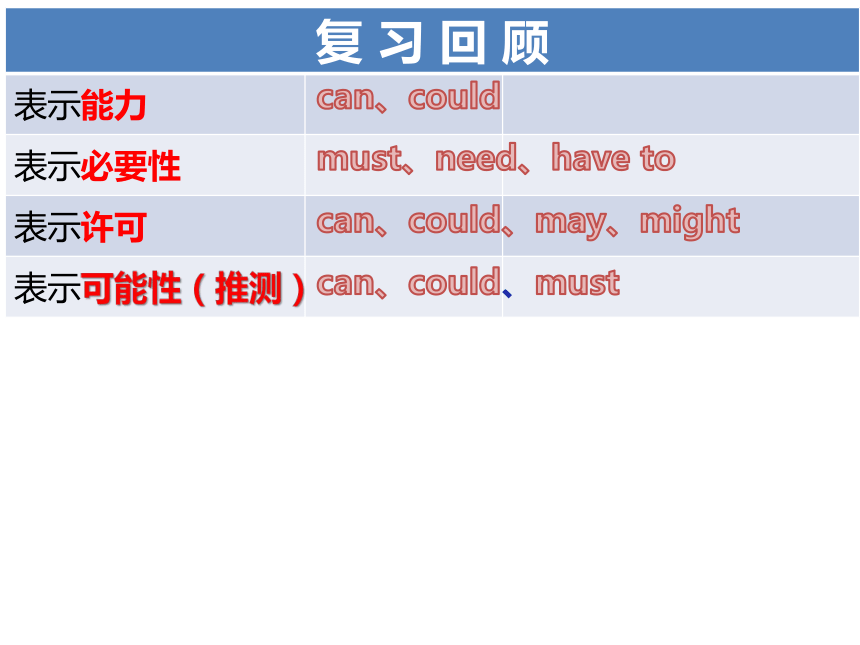
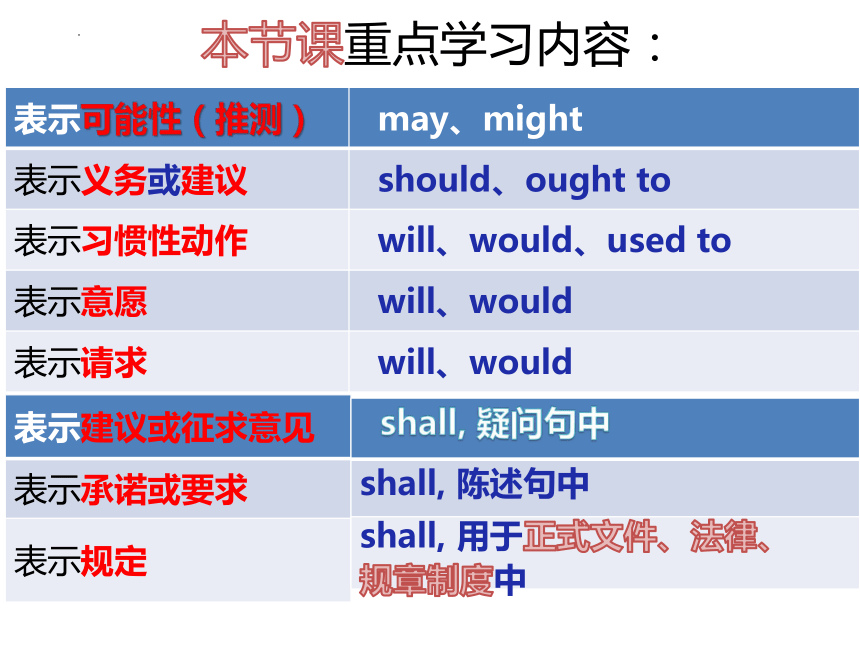
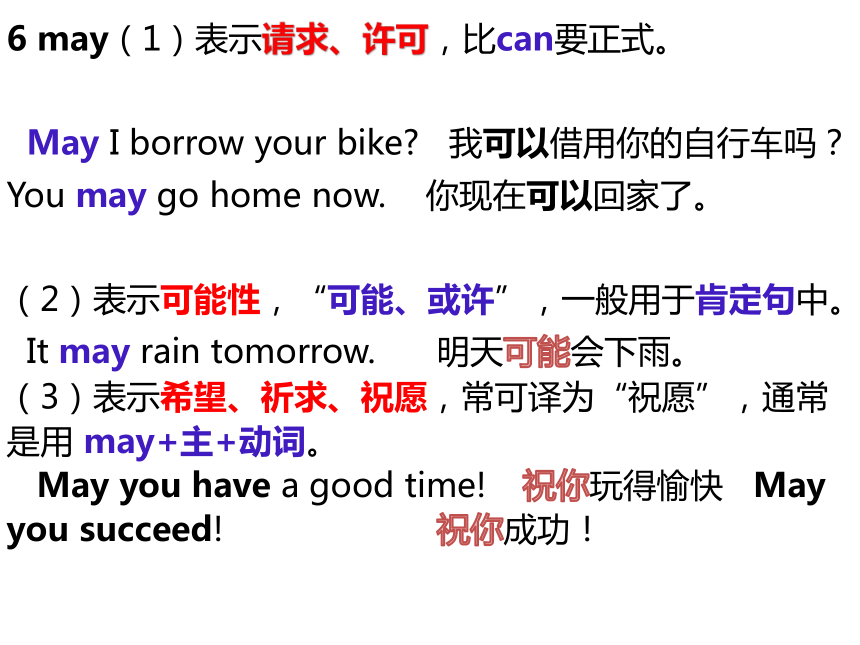
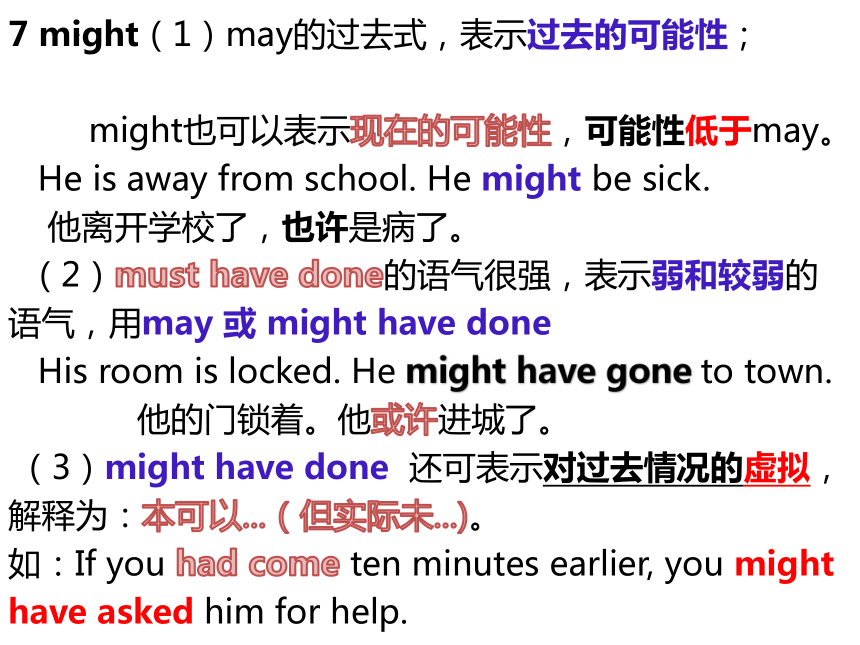
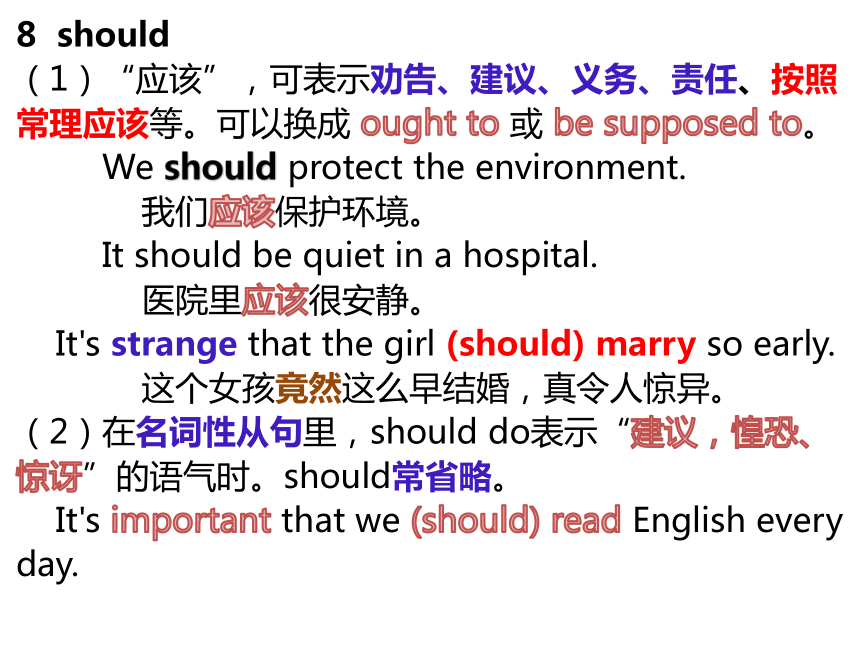
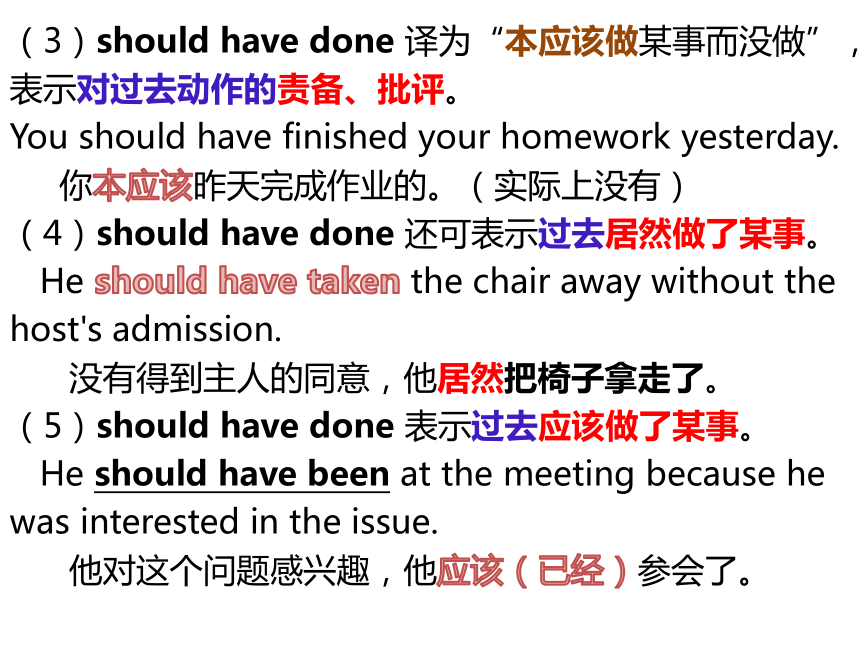
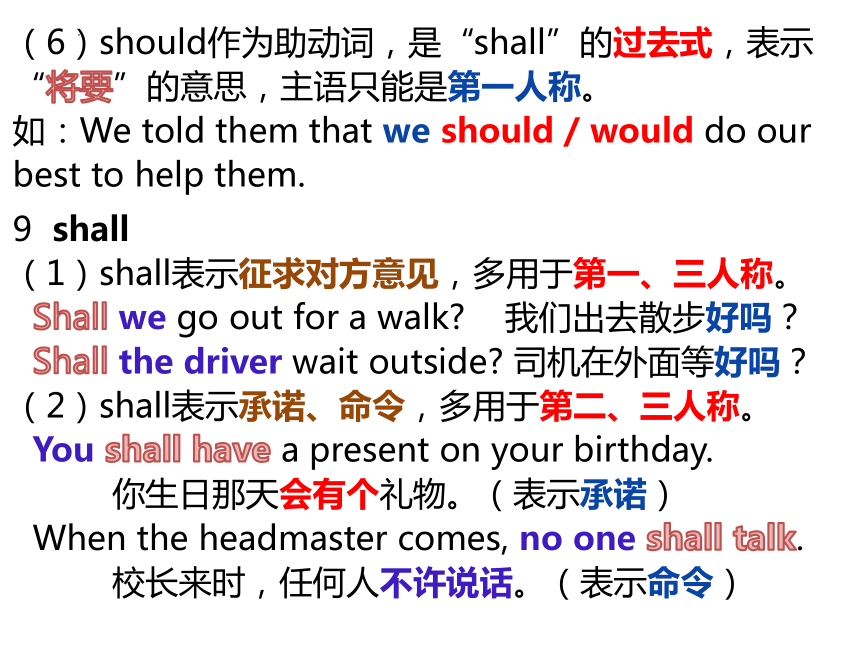
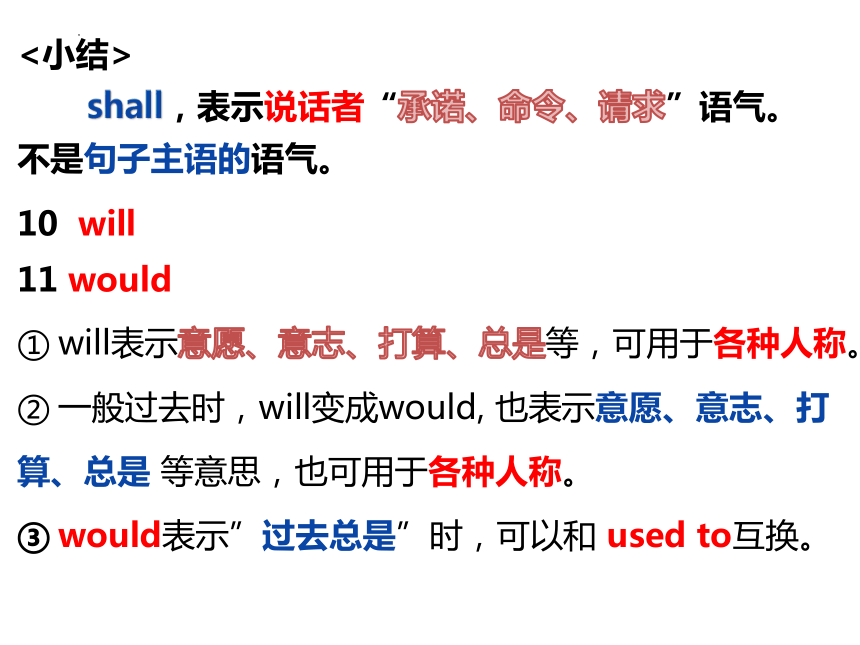
文档简介
(共22张PPT)
必修二 Unit 4 Grammar and usage
Model verbs
情态动词
第二课时
复 习 回 顾 表示能力
表示必要性
表示许可
表示可能性(推测)
can、could
must、need、have to
can、could、may、might
can、could、must
表示可能性(推测) may、might
表示义务或建议 should、ought to
表示习惯性动作 will、would、used to
表示意愿 will、would
表示请求 will、would
表示建议或征求意见
表示承诺或要求
表示规定
shall, 疑问句中
shall, 陈述句中
shall, 用于正式文件、法律、规章制度中
本节课重点学习内容:
6 may(1)表示请求、许可,比can要正式。
May I borrow your bike 我可以借用你的自行车吗? You may go home now. 你现在可以回家了。
(2)表示可能性,“可能、或许”,一般用于肯定句中。
It may rain tomorrow. 明天可能会下雨。
(3)表示希望、祈求、祝愿,常可译为“祝愿”,通常是用 may+主+动词。
May you have a good time! 祝你玩得愉快 May you succeed! 祝你成功!
7 might(1)may的过去式,表示过去的可能性;
might也可以表示现在的可能性,可能性低于may。
He is away from school. He might be sick.
他离开学校了,也许是病了。
(2)must have done的语气很强,表示弱和较弱的语气,用may 或 might have done
His room is locked. He might have gone to town.
他的门锁着。他或许进城了。
(3)might have done 还可表示对过去情况的虚拟,解释为:本可以...(但实际未...)。
如:If you had come ten minutes earlier, you might have asked him for help.
8 should
(1)“应该”,可表示劝告、建议、义务、责任、按照常理应该等。可以换成 ought to 或 be supposed to。
We should protect the environment.
我们应该保护环境。
It should be quiet in a hospital.
医院里应该很安静。
It's strange that the girl (should) marry so early.
这个女孩竟然这么早结婚,真令人惊异。
(2)在名词性从句里,should do表示“建议,惶恐、惊讶”的语气时。should常省略。
It's important that we (should) read English every day.
(3)should have done 译为“本应该做某事而没做”,表示对过去动作的责备、批评。
You should have finished your homework yesterday.
你本应该昨天完成作业的。(实际上没有)
(4)should have done 还可表示过去居然做了某事。
He should have taken the chair away without the host's admission.
没有得到主人的同意,他居然把椅子拿走了。
(5)should have done 表示过去应该做了某事。
He should have been at the meeting because he was interested in the issue.
他对这个问题感兴趣,他应该(已经)参会了。
(6)should作为助动词,是“shall”的过去式,表示“将要”的意思,主语只能是第一人称。
如:We told them that we should / would do our best to help them.
9 shall
(1)shall表示征求对方意见,多用于第一、三人称。
Shall we go out for a walk 我们出去散步好吗?
Shall the driver wait outside 司机在外面等好吗?
(2)shall表示承诺、命令,多用于第二、三人称。
You shall have a present on your birthday.
你生日那天会有个礼物。(表示承诺)
When the headmaster comes, no one shall talk.
校长来时,任何人不许说话。(表示命令)
<小结>
shall,表示说话者“承诺、命令、请求”语气。
不是句子主语的语气。
10 will
11 would
① will表示意愿、意志、打算、总是等,可用于各种人称。
② 一般过去时,will变成would, 也表示意愿、意志、打算、总是 等意思,也可用于各种人称。
③ would表示”过去总是”时,可以和 used to互换。
注意:
构成一般、过去将来时的“will”和“would”解释为“将要...”这个意思时,不是情态动词,是助动词。
If it's possible, he will talk for hours.
如果可能的话,他会滔滔不绝谈上几个小时。
No matter how hard I push the door,it won't open.
不管我怎么推,门总是开不了。
12 dare“敢、敢于”,用法类似于need,有两种词性。
① 作为情态动词,多用于否定句、疑问句或者条件句中,只有一般现在时和一般过去时。
Dare he tell them what he knows (疑问句)
I daren't ask her. Will you do it for me (否定句)
② 作为实义动词(行为动词)时,有人称、时态、单复数的变化。
He doesn't dare to break his promise.
13 had better 译为“最好”,没有人称的变化,后面接不带to的不定式,其否定形式为had better not; We had better (not)go now.可以换成: may as well 或 might as well.
重点关注:
1 can/could/may/might have done sth.
推测过去时间里可能发生过的事情;
比 must have+done sth 语气弱。
Philip can/could/may/might have been hurt seriously in the car accident.
菲利普在车祸中可能受到过很严重的伤。
2 must have done sth.
对过去时间里发生过的事情的推测,语气强,译为“肯定、一定做过某事”
She must have gone by bus.
3 should/ought to have done sth.
过去本应该做某事,而事实上并没有做,
否定形式:shouldn't / oughtn't to have done 表示“过去不该做某事而做了”。
You ought to /should have been more careful in this experiment.
你在试验中本应该更小心的。(实际上没有)
He ought not to have thrown the old clothes away.
他本不应该扔掉旧衣服的。(实际上扔了)
4 needn't have done sth.
过去本没必要做某事却做了
I dressed very warmly for the trip, but I needn't have done so. The weather was hot. 5 would like to have done sth.
过去本想做某事而没做
I would like to have read the article, but I was very busy then.
巩固练习:
1 You read that article if you don't want to.
A can't B mustn't C needn't D must
2 I get this done immediately or it will be too late.
A must B can C may D might
3 The house is dark; the Browns to bed.
A may go B should go
C should have gone D must have gone
1 C 2 D 3 D
4 --The car must have cost a lot of money.
-- Oh,no, .
A it mustn't B it hasn't
C it doesn't D it didn't
5 I'm feeling sick. I so much chocolate.
A needn't have eaten B couldn't have eaten
C mustn't have eaten D shouldn't have eaten
6 My wallet is nowhere to be found. I when I was on the bus.
A must have dropped it B must drop it
C should have dropped it D ought to have
4 D 5 D 6 A
7 You could have done much better yesterday.
Why
A didn't you B couldn't you
C hadn't you D shouldn't you
8 They have done things they ought .
A not to do B not to be done
C not to have done D not having done
9 --Are you coming to Tom's party
--I'm not sure. I go to the concert instead.
A must B would C should D might
7 A 8 C 9 D
10 --Will you stay for lunch
--Sorry, . My brother is coming.
A I mustnt' B I can't
C I needn't D I won't
11 --I heard they went skiing in the mountains.
--It true because there was little snow there.
A may not be B won't be
C couldn't be D mustn't be
12 Someone is coming here. Who it be
A will B shall C must D can
10 B 11 C 12 D
填空题:
1 I you, because I thought I must be wrong. (不敢问)
2 There some flowers in the garden.
(曾经有)
3 --Need we do this job right now
--Yes, you .
4 --Is John coming by train
--He should, but he not. He likes driving his car.
5 Mike not be a policeman, for he is too short.
dare not ask
used to be
must
may / might
can / could
6 --I stayed at a hotel while in New York.
--Oh, did you You with Barbara.
(本可以待在一起)
7 The hotel is only a stone's throw away, you
take a bus. (不必)
8 I am busy now, my brother do it for you
9 My dictionary has disappeared. Who have taken it
10 --Don't get near to it. It is too dangerous.
--No, I not.
could have stayed
needn't
don't need to
shall
could
will
Thank you for your attention!
必修二 Unit 4 Grammar and usage
Model verbs
情态动词
第二课时
复 习 回 顾 表示能力
表示必要性
表示许可
表示可能性(推测)
can、could
must、need、have to
can、could、may、might
can、could、must
表示可能性(推测) may、might
表示义务或建议 should、ought to
表示习惯性动作 will、would、used to
表示意愿 will、would
表示请求 will、would
表示建议或征求意见
表示承诺或要求
表示规定
shall, 疑问句中
shall, 陈述句中
shall, 用于正式文件、法律、规章制度中
本节课重点学习内容:
6 may(1)表示请求、许可,比can要正式。
May I borrow your bike 我可以借用你的自行车吗? You may go home now. 你现在可以回家了。
(2)表示可能性,“可能、或许”,一般用于肯定句中。
It may rain tomorrow. 明天可能会下雨。
(3)表示希望、祈求、祝愿,常可译为“祝愿”,通常是用 may+主+动词。
May you have a good time! 祝你玩得愉快 May you succeed! 祝你成功!
7 might(1)may的过去式,表示过去的可能性;
might也可以表示现在的可能性,可能性低于may。
He is away from school. He might be sick.
他离开学校了,也许是病了。
(2)must have done的语气很强,表示弱和较弱的语气,用may 或 might have done
His room is locked. He might have gone to town.
他的门锁着。他或许进城了。
(3)might have done 还可表示对过去情况的虚拟,解释为:本可以...(但实际未...)。
如:If you had come ten minutes earlier, you might have asked him for help.
8 should
(1)“应该”,可表示劝告、建议、义务、责任、按照常理应该等。可以换成 ought to 或 be supposed to。
We should protect the environment.
我们应该保护环境。
It should be quiet in a hospital.
医院里应该很安静。
It's strange that the girl (should) marry so early.
这个女孩竟然这么早结婚,真令人惊异。
(2)在名词性从句里,should do表示“建议,惶恐、惊讶”的语气时。should常省略。
It's important that we (should) read English every day.
(3)should have done 译为“本应该做某事而没做”,表示对过去动作的责备、批评。
You should have finished your homework yesterday.
你本应该昨天完成作业的。(实际上没有)
(4)should have done 还可表示过去居然做了某事。
He should have taken the chair away without the host's admission.
没有得到主人的同意,他居然把椅子拿走了。
(5)should have done 表示过去应该做了某事。
He should have been at the meeting because he was interested in the issue.
他对这个问题感兴趣,他应该(已经)参会了。
(6)should作为助动词,是“shall”的过去式,表示“将要”的意思,主语只能是第一人称。
如:We told them that we should / would do our best to help them.
9 shall
(1)shall表示征求对方意见,多用于第一、三人称。
Shall we go out for a walk 我们出去散步好吗?
Shall the driver wait outside 司机在外面等好吗?
(2)shall表示承诺、命令,多用于第二、三人称。
You shall have a present on your birthday.
你生日那天会有个礼物。(表示承诺)
When the headmaster comes, no one shall talk.
校长来时,任何人不许说话。(表示命令)
<小结>
shall,表示说话者“承诺、命令、请求”语气。
不是句子主语的语气。
10 will
11 would
① will表示意愿、意志、打算、总是等,可用于各种人称。
② 一般过去时,will变成would, 也表示意愿、意志、打算、总是 等意思,也可用于各种人称。
③ would表示”过去总是”时,可以和 used to互换。
注意:
构成一般、过去将来时的“will”和“would”解释为“将要...”这个意思时,不是情态动词,是助动词。
If it's possible, he will talk for hours.
如果可能的话,他会滔滔不绝谈上几个小时。
No matter how hard I push the door,it won't open.
不管我怎么推,门总是开不了。
12 dare“敢、敢于”,用法类似于need,有两种词性。
① 作为情态动词,多用于否定句、疑问句或者条件句中,只有一般现在时和一般过去时。
Dare he tell them what he knows (疑问句)
I daren't ask her. Will you do it for me (否定句)
② 作为实义动词(行为动词)时,有人称、时态、单复数的变化。
He doesn't dare to break his promise.
13 had better 译为“最好”,没有人称的变化,后面接不带to的不定式,其否定形式为had better not; We had better (not)go now.可以换成: may as well 或 might as well.
重点关注:
1 can/could/may/might have done sth.
推测过去时间里可能发生过的事情;
比 must have+done sth 语气弱。
Philip can/could/may/might have been hurt seriously in the car accident.
菲利普在车祸中可能受到过很严重的伤。
2 must have done sth.
对过去时间里发生过的事情的推测,语气强,译为“肯定、一定做过某事”
She must have gone by bus.
3 should/ought to have done sth.
过去本应该做某事,而事实上并没有做,
否定形式:shouldn't / oughtn't to have done 表示“过去不该做某事而做了”。
You ought to /should have been more careful in this experiment.
你在试验中本应该更小心的。(实际上没有)
He ought not to have thrown the old clothes away.
他本不应该扔掉旧衣服的。(实际上扔了)
4 needn't have done sth.
过去本没必要做某事却做了
I dressed very warmly for the trip, but I needn't have done so. The weather was hot. 5 would like to have done sth.
过去本想做某事而没做
I would like to have read the article, but I was very busy then.
巩固练习:
1 You read that article if you don't want to.
A can't B mustn't C needn't D must
2 I get this done immediately or it will be too late.
A must B can C may D might
3 The house is dark; the Browns to bed.
A may go B should go
C should have gone D must have gone
1 C 2 D 3 D
4 --The car must have cost a lot of money.
-- Oh,no, .
A it mustn't B it hasn't
C it doesn't D it didn't
5 I'm feeling sick. I so much chocolate.
A needn't have eaten B couldn't have eaten
C mustn't have eaten D shouldn't have eaten
6 My wallet is nowhere to be found. I when I was on the bus.
A must have dropped it B must drop it
C should have dropped it D ought to have
4 D 5 D 6 A
7 You could have done much better yesterday.
Why
A didn't you B couldn't you
C hadn't you D shouldn't you
8 They have done things they ought .
A not to do B not to be done
C not to have done D not having done
9 --Are you coming to Tom's party
--I'm not sure. I go to the concert instead.
A must B would C should D might
7 A 8 C 9 D
10 --Will you stay for lunch
--Sorry, . My brother is coming.
A I mustnt' B I can't
C I needn't D I won't
11 --I heard they went skiing in the mountains.
--It true because there was little snow there.
A may not be B won't be
C couldn't be D mustn't be
12 Someone is coming here. Who it be
A will B shall C must D can
10 B 11 C 12 D
填空题:
1 I you, because I thought I must be wrong. (不敢问)
2 There some flowers in the garden.
(曾经有)
3 --Need we do this job right now
--Yes, you .
4 --Is John coming by train
--He should, but he not. He likes driving his car.
5 Mike not be a policeman, for he is too short.
dare not ask
used to be
must
may / might
can / could
6 --I stayed at a hotel while in New York.
--Oh, did you You with Barbara.
(本可以待在一起)
7 The hotel is only a stone's throw away, you
take a bus. (不必)
8 I am busy now, my brother do it for you
9 My dictionary has disappeared. Who have taken it
10 --Don't get near to it. It is too dangerous.
--No, I not.
could have stayed
needn't
don't need to
shall
could
will
Thank you for your attention!
